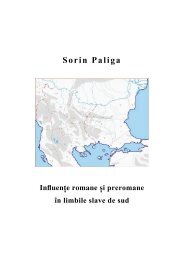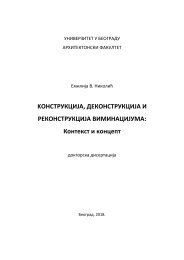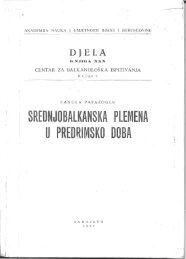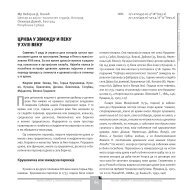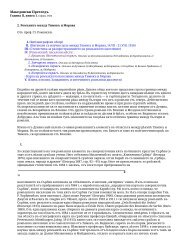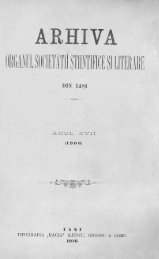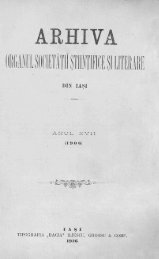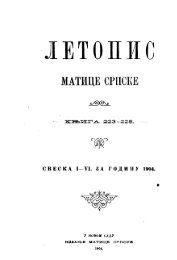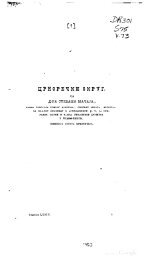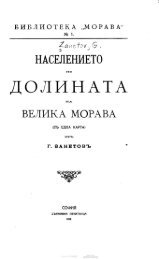The Construction of National Identity and its Challenges in Post-Yugoslav Censuses
Create successful ePaper yourself
Turn your PDF publications into a flip-book with our unique Google optimized e-Paper software.
<strong>The</strong> <strong>Construction</strong> <strong>of</strong> <strong>National</strong> <strong>Identity</strong> <strong>and</strong> <strong>its</strong> <strong>Challenges</strong> 887<br />
categories. Bosnia follows the logic <strong>of</strong> the tr<strong>in</strong>ational state (Bosniak, Serb, Croat; Islam,<br />
Orthodox, Catholic; <strong>and</strong> Bosnian, Serbian, <strong>and</strong> Croat, respectively), while <strong>in</strong> Kosovo all<br />
<strong>of</strong> the recognized identity groups are listed. Lastly, the census <strong>of</strong> Montenegro only <strong>of</strong>fers<br />
options for languages (Montenegr<strong>in</strong>, Serbian, Bosnian, Albanian, Croatian, or any other<br />
language), but not for national identity or religion.<br />
All census forms have an additional write-<strong>in</strong> category for other identities <strong>in</strong> the categories<br />
<strong>of</strong> religion, language, <strong>and</strong> national identity, <strong>and</strong> the possibility to rema<strong>in</strong> undeclared <strong>in</strong><br />
answer<strong>in</strong>g the question on national identity <strong>and</strong> religion.<br />
While Croatia did not allow for multiple identities (Jović, 2011:41), Montenegro <strong>and</strong><br />
Serbia did allow for such self-identification, although this is not noted explicitly on the<br />
form. While all permit write-<strong>in</strong> categories, <strong>and</strong> citizens are not precluded from identify<strong>in</strong>g<br />
themselves with several groups, such categories are neither <strong>of</strong>fered, nor do the forms<br />
explicitly <strong>of</strong>fer such a choice.<br />
F<strong>in</strong>ally, the level to which citizens can opt out varies among censuses. In all countries,<br />
national identity was a voluntary category (although it was not explicitly marked as such<br />
<strong>in</strong> Croatia), <strong>and</strong> religion was a voluntary category <strong>in</strong> all cases except Montenegro.<br />
<strong>The</strong> forms <strong>and</strong> the categories they establish also <strong>of</strong>fer an <strong>in</strong>sight <strong>in</strong>to the state selfconception,<br />
<strong>and</strong> how the state negotiates the three constra<strong>in</strong>ts on the categorization noted<br />
above. It is no surprise to scholars <strong>of</strong> Southeastern Europe that national identity is determ<strong>in</strong>ed<br />
by not just self-identification with a nation, but also through religion <strong>and</strong> language.<br />
This may be done explicitly, as <strong>in</strong> Macedonia <strong>and</strong> Serbia, or implicitly, as done elsewhere.<br />
Thus, the census forms not only reflect these common underst<strong>and</strong><strong>in</strong>gs <strong>of</strong> identity, but also<br />
reaffirm them through pos<strong>in</strong>g lead<strong>in</strong>g questions to respondents. <strong>The</strong> questionnaires also<br />
reveal the degree to which a state def<strong>in</strong>es <strong>its</strong>elf as a nation-state or otherwise. While Croatia<br />
<strong>of</strong>fers only the options <strong>of</strong> Croat–Croatian–Catholic as predeterm<strong>in</strong>ed identity categories,<br />
others leave more space. When the state gives great constitutional weight to identity, the<br />
legally relevant categories are listed, such as <strong>in</strong> Bosnia <strong>and</strong> Kosovo. Thus, Croatia emerges<br />
as a nation-state, whereas Kosovo <strong>and</strong> Bosnia are clearly mult<strong>in</strong>ational states with group<br />
rights, <strong>and</strong> Montenegro <strong>and</strong> Serbia leave some space for a more or less rigid underst<strong>and</strong><strong>in</strong>g<br />
<strong>of</strong> identity. <strong>The</strong> largely voluntary nature <strong>of</strong> these identity markers is both a legacy <strong>of</strong> the<br />
socialist <strong>Yugoslav</strong> censuses <strong>and</strong> the <strong>in</strong>ternational st<strong>and</strong>ards.<br />
Census Election Campaigns<br />
Cont<strong>in</strong>u<strong>in</strong>g our <strong>in</strong>quiry <strong>in</strong>to the census as a site <strong>of</strong> contestation, we now turn to social<br />
actors who seek to shape the outcome <strong>of</strong> the census. <strong>The</strong>se are primarily ethnic entrepreneurs<br />
who are <strong>in</strong>vested <strong>in</strong> the identity-specific outcome <strong>of</strong> the census. <strong>The</strong>se <strong>in</strong>clude NGOs,<br />
political parties, <strong>and</strong> religious <strong>and</strong> cultural <strong>in</strong>stitutions, such as the Serb <strong>National</strong> Council<br />
<strong>in</strong> Croatia, mentioned at the beg<strong>in</strong>n<strong>in</strong>g <strong>of</strong> the article.<br />
It is a common adage that <strong>in</strong> divided societies, such as Bosnia, elections resemble censuses,<br />
with vot<strong>in</strong>g patterns follow<strong>in</strong>g ethnic l<strong>in</strong>es. While this is <strong>of</strong>ten true, censuses, <strong>in</strong> turn, also<br />
resemble elections. Campaigns are held, politicians <strong>and</strong> public figures call for citizens to<br />
make particular choices, <strong>and</strong> the results have political consequences (Jović, 2011).<br />
<strong>The</strong>re are three key reasons why political actors care about censuses. First, census results<br />
serve as a basis for concrete legal entitlements. In most post-<strong>Yugoslav</strong> countries, the local<br />
share <strong>of</strong> m<strong>in</strong>ority populations translates <strong>in</strong>to specific l<strong>in</strong>guistic or educational m<strong>in</strong>ority<br />
rights, <strong>and</strong> possible access to political representation. Thus, m<strong>in</strong>ority representatives have a<br />
vested <strong>in</strong>terest <strong>in</strong> secur<strong>in</strong>g a high number <strong>of</strong> m<strong>in</strong>orities <strong>in</strong> particular regions. In the Croatian






